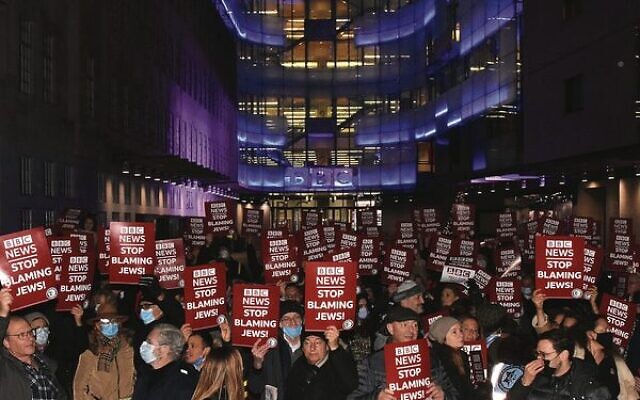BBC sorry, but stands by bus attack report

THE BBC has slightly revised a hotly-contested article that had infuriated British Jews by seeming to blame the victims of an antisemitic incident.
In addition to adding a clarifying note to the article, the BBC said, “We apologise for not doing more to highlight that these details were contested – we should have reflected this and acted sooner.”
The initial report on a November 29 incident in London, in which several young men were filmed intimidating Jews celebrating Chanukah, indicated that “racial slurs about Muslims could be heard inside the bus”.
The line was later changed from “slurs” to “slur”.
A note appended to the online article on Wednesday adds that the claim about an anti-Muslim slur “has been disputed by Hebrew speakers and others”.
A BBC spokesperson in a statement called this change a “clarification”.
The report, which critics said was lacking evidence, prompted indignation from British Jewish groups, some of whom said it encapsulated a bigger problem in the BBC’s coverage of antisemitism, Jews and Israel.
The Board of Deputies of British Jews in a statement said it was “dismayed” that the BBC “continues to justify certain erroneous editorial decisions that continue to cloud the issue”.
The Office of Communications, a government regulator of media, has decided to launch its own review of the BBC’s reporting, the Board said. “We trust that justice will prevail.”
Following the uproar over the article – including a demonstration in December by 200 people outside BBC headquarters organised by the Campaign Against Antisemitism (CAA) – the BBC had its executive complaints unit examine the complaints.
The unit said the article “did not meet the BBC’s standards of due accuracy” but it largely vindicated the original report, stating that there was “an ‘overriding focus’ on those who directed abuse at the passengers on the bus and there was no evidence to support any claims of victim-blaming in our reporting”.
But, the unit also wrote, “the anti-Muslim slur claim has itself become controversial” and “it also lacks due impartiality in failing to reflect alternative views”.
The BBC claims it had four experts listen to recordings of the incident, with three of them saying they heard the phrase “dirty Muslims” uttered in the bus, the unit’s report said.
The fourth heard a phrase that the unit translated as meaning “call someone, it’s urgent,” its report said.
In an analysis commissioned by the Board of Deputies of British Jews of the same recording, an expert concurred that the phrase interpreted by BBC to be an anti-Muslim slur was actually “tikrah l’mishehu, ze dachuf,” which means “call someone, it’s urgent”.
JTA

comments